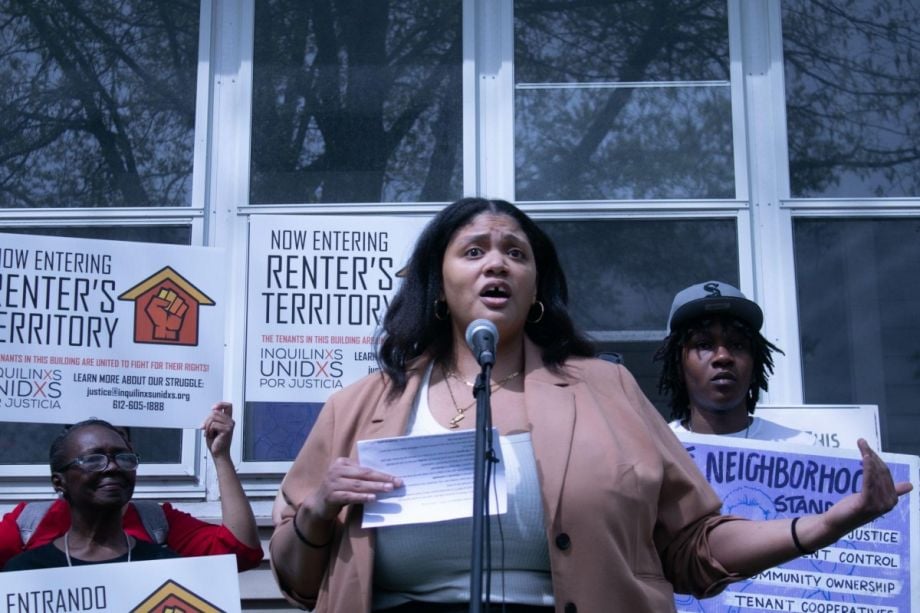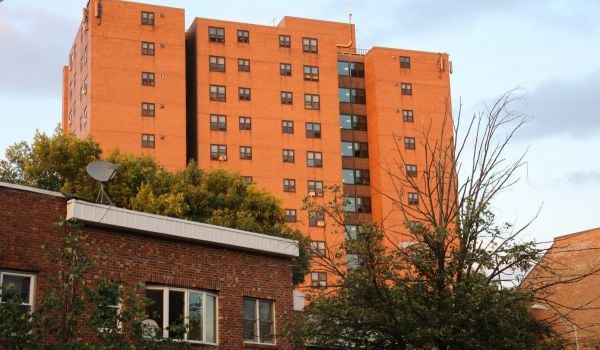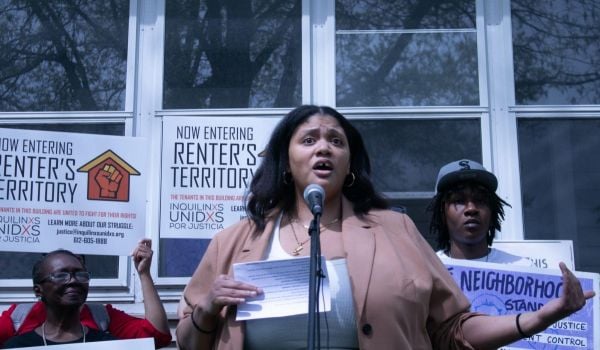Minneapolis Tenants Reach Agreement With Private Equity Homeowner
Last year, I wrote about a group of tenants in single-family homes putting their rent in escrow until they received needed repairs. The homes are owned by a firm called Progress Residential, owned by another private-equity backed firm called Pretium.
Today, thanks to tenant organizing, Progress will sign an agreement with the City of Minneapolis to allow it to continue operating in the city. The agreement requires Progress to coordinate with the city on needed inspections, allow tenants to vacate their lease without penalty if there are safety issues, to respond to all “heating, ventilation, air conditioning, water leak, and moisture intrusion issues” within 24 hours and to develop a “preventative maintenance plan” requiring more proactive inspection, 24-hour phone support and yard rubbish removal.
In a statement, Inquilinxs Unidxs Por Justicia / United Renters for Justice, which has been organizing tenants, said: “Tenants will call on Progress Residential to follow through on the agreements that have been signed and for the City of Minneapolis to hold Progress Residential and the landlord accountable. As long as the City of Minneapolis upholds these agreements, tenants are expected to see major improvements in their lives.”
Manhattan Tenants Beats Blackstone in Court, Wins Right To Keep Units Rent Stabilized
In another win for tenants over private equity, tenants at Stuyvesant Town-Peter Cooper Village have won a lawsuit that will keep rent stabilized units in the apartment complex from being deregulated, according to Gothamist. Blackstone, a massive private equity firm that has over $40 billion in assets and manages another $881 billion of other people’s money, purchased the 11,000 unit housing complex in 2015. The city waived $77 million in taxes in order for Blackstone to keep half the units rent-stabilized for 20 years. But tenant groups sued to keep any rent-stabilized units from being converted to market-rate. Last week, a judge agreed.
“We’re getting a lot of emails from people who are congratulating us and, you know — ‘this is fantastic, wow, didn’t think it would happen, now I can stay in my apartment’ — people are happy,” tenant leader Susan Steinberg told Gothamist.
Gov. Hochul Pitches Construction-Heavy Housing Plan
In her state of the state speech on Tuesday, New York Gov. Kathy Hochul pitched a plan to address the state’s affordability crisis by boosting supply. Through mandates to produce new housing, zoning deregulation and a modified version of a controversial tax break, Hochul said the state could produce 800,000 new units within the next 10 years, twice as many as in the previous 10 years.
Calling New York State’s zoning regulations “the most restrictive in the nation,” Hochul said “local communities hold enormous power to block growth.” She singled out New York City and its suburbs, including Long Island and Westchester. Under her proposal, different regions will have different targets for new housing construction; downstate localities would have to increase housing stock by 3% over three years, and upstate by 1%. Officials in the Hochul administration had previously said that if locals reject developments, a new Housing Approval Board could overrule them, according to the New York Post.
Hochul’s plan also involves rezoning neighborhoods surrounding train stations to allow for more density. And, in a plan long sought by advocates, she said they will pass new regulations to legalize basement apartments, according to City & State New York.
As part of a flank of proposals to address severe mental illness, Hochul also proposed 3,500 new supportive housing units with intensive mental health service.
Much of the plan will depend on the details, likely to be included in the next executive budget. But she is firmly siding with the notion that supply is the chief problem hurting affordability statewide, and that community control is the reason why.
It’s true that housing production across the country stalled after the 2008 financial crisis, one of the causes for the current affordability crisis. Yet new building permits in 2022 reached a 50-year peak in 2021 and 2022, and New York City led the country in apartment construction. By tying her override of community control to housing production, Hochul seems to be targeting suburban NIMBYs.
But the overly broad proposal – Hochul did not mention any affordability requirements – might also stifle anti-gentrification activists concerned about market rate units built in their neighborhoods. Studies have shown market rate units ease housing costs unevenly and can displace the lowest income renters. UC Berkeley’s Urban Displacement Project has called for pairing new housing production with good cause protections and social housing.
Advocates Weigh In On Hochul’s Housing Plan
Hochul’s proposals drew some praise, including a long-delayed plan to legalize basement apartments. These calls were renewed after the death of 13 New Yorkers in 2021, most living in basement apartments, following Hurricane Ida. Despite much talk, little progress had been made a year after the storm.
But many also criticized Hochul’s housing plan for focusing almost exclusively on housing production and zoning and not on tenant protections. Public advocate and former gubernatorial candidate Jumaane Williams called Hochul’s affordability targets “unclear” and asked her and Mayor Eric Adams to set goals for income-targeted units.
The Supportive Housing New York of New York released a statement praising the proposal for new supportive housing, but asking the governor to also fund existing supportive housing developments, saying, “Due to years of chronic underfunding, thousands of supportive developments across the state are short-staffed and in desperate need of repair.”
Many also called on the governor to support Good Cause eviction protections, which faltered in 2022’s legislative session. “Good Cause” would limit the reasons a landlord can evict a tenant and, in last year’s version of the bill, limit rent increases by 3% a year. Assembly member Phara Souffrant Forrest tweeted, “The governor has only mentioned new housing units, nothing abt tenant protections or rental assistance to keep ppl in those units. Without protections, our housing crisis will only get worse. If housing is really a human right, we must pass good cause & HAVP!”
HAVP refers to the Housing Access Voucher Program, a proposal targeted to people experiencing homelessness who are seeking permanent housing. The vouchers would pay at least 70% of a tenant’s rent and replace the confusing patchwork of housing vouchers unhoused people currently rely on.
This article is part of Backyard, a newsletter exploring scalable solutions to make housing fairer, more affordable and more environmentally sustainable. Subscribe to our weekly Backyard newsletter.

Roshan Abraham is Next City's housing correspondent and a former Equitable Cities fellow. He is based in Queens. Follow him on Twitter at @roshantone.


















